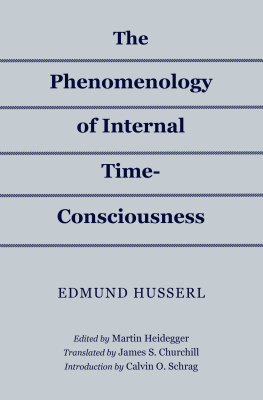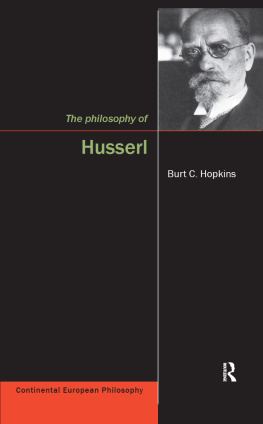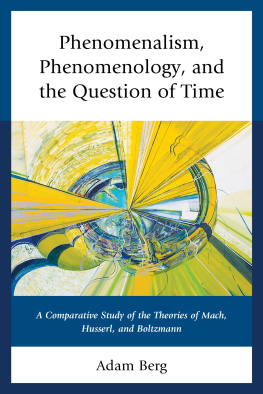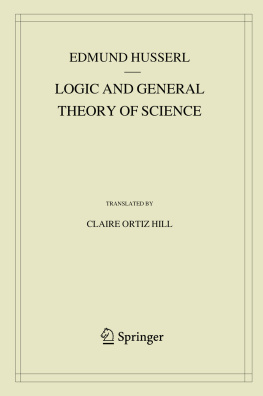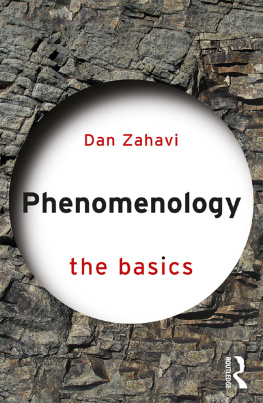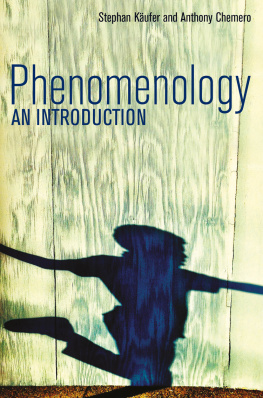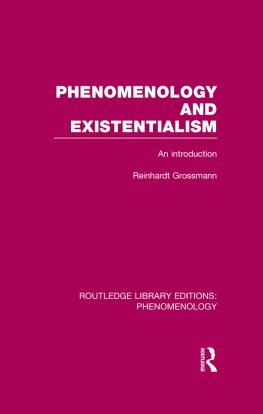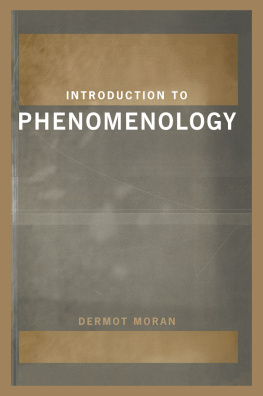Husserl - Ideas: general introduction to pure phenomenology
Here you can read online Husserl - Ideas: general introduction to pure phenomenology full text of the book (entire story) in english for free. Download pdf and epub, get meaning, cover and reviews about this ebook. City: New York;Abingdon;Oxon, year: 2013;2012, publisher: Taylor & Francis;Routledge, genre: Religion. Description of the work, (preface) as well as reviews are available. Best literature library LitArk.com created for fans of good reading and offers a wide selection of genres:
Romance novel
Science fiction
Adventure
Detective
Science
History
Home and family
Prose
Art
Politics
Computer
Non-fiction
Religion
Business
Children
Humor
Choose a favorite category and find really read worthwhile books. Enjoy immersion in the world of imagination, feel the emotions of the characters or learn something new for yourself, make an fascinating discovery.
Ideas: general introduction to pure phenomenology: summary, description and annotation
We offer to read an annotation, description, summary or preface (depends on what the author of the book "Ideas: general introduction to pure phenomenology" wrote himself). If you haven't found the necessary information about the book — write in the comments, we will try to find it.
Husserl: author's other books
Who wrote Ideas: general introduction to pure phenomenology? Find out the surname, the name of the author of the book and a list of all author's works by series.
Ideas: general introduction to pure phenomenology — read online for free the complete book (whole text) full work
Below is the text of the book, divided by pages. System saving the place of the last page read, allows you to conveniently read the book "Ideas: general introduction to pure phenomenology" online for free, without having to search again every time where you left off. Put a bookmark, and you can go to the page where you finished reading at any time.
Font size:
Interval:
Bookmark:

[T]he work here presented seeks to found a new science though, indeed, the whole course of philosophical development since Descartes has been preparing the way for it a science covering a new field of experience, exclusively its own, that of Transcendental Subjectivity.
Edmund Husserl, from the authors preface to the English Edition

Routledge Classics contains the very best of Routledge publishing over the past century or so, books that have, by popular consent, become established as Classics in their field. Drawing on a fantastic heritage of innovative writing published by Routledge and its associated imprints, this form some of the most important works of modern times.
For a Complete list of titles visit
www.routledge.com/classics
With a new foreword by Dermot Moran
Translated by W. R. Boyce Gibson

First published in 1931
Reprinted in 2002 by Routledge
First published in the Routledge Classics 2012
by Routledge
2 Park Square, Milton Park, Abingdon, Oxon OX14 4RN
Simultaneously published in the USA and Canada
by Routledge
711 Third Avenue, New York, NY 10017
Routledge is an imprint of the Taylor & Francis Group, an informa business
Foreword 2012 Dermot Moran
2012 Routledge
The right of Edmund Husserl to be identified as author of this work has been asserted by him in accordance with sections 77 and 78 of the Copyright, Designs and Patents Act 1988.
All rights reserved. No part of this book may be reprinted or reproduced or utilised in any form or by any electronic, mechanical, or other means, now known or hereafter invented, including photocopying and recording, or in any information storage or retrieval system, without permission in writing from the publishers.
Trademark notice : Product or corporate names may be trademarks or registered trademarks, and are used only for identification and explanation without intent to infringe.
British Library Cataloguing in Publication Data
A catalogue record for this book is available from the British Library
Library of Congress Cataloging in Publication Data
Husserl, Edmund, 18591938.
[Ideen zu einer reinen Phnomenologie. English]
Ideas : general introduction to pure phenomenology / Edmund
Husserl ; with a new introduction by Dermot Moran.
p. cm.(Routledge classics)
Includes bibliographical references (p. ) and indexes.
1. Phenomenology. I. Title.
B3279.H93I33 2012
142.7dc23
2012001912
ISBN: 9780415519038 (pbk)
Typeset in Joanna
by RefineCatch Limited, Bungay, Suffolk, UK
| 13. | |
| 37. | |
| 60. | |
| 83. | |
| 108. | |
| 132. | |
| 151. | |
One hundred years ago, on 2 April 1913, Edmund Husserl published the First Book of his planned three-volume Ideen zu einer reinen Phnomenologie und phnomenologischen Philosophie . Erstes Buch : Allgemeine Einfhrung in die reine Phnomenologie ( Ideas towards a Pure Phenomenology and to a Phenomenological Philosophy: General Introduction to Pure Phenomenology , hereafter Ideas ) in Volume One of his newly founded Jahrbuch fr Philosophie und phnomenologische Forschung ( Yearbook for Philosophy and Phenomenological Research ),
It is important for several reasons to have Boyce Gibsons translation available once more in print in the Routledge Classics series. Boyce Gibsons translation was the first of Husserls works to appear in English and was for many years the only source for English readers. Moreover Gibson had personally studied with Husserl in Freiburg in 1928 and Husserl obviously held him in high regard, even supplying him with a number of unpublished manuscripts which expanded on or revised points discussed in Ideas (primarily on Husserls changing views on the reduction). Husserl saw the translation as an opportunity to elaborate on his new developments and promised to write both a Preface and a Postface to the translation. As Boyce Gibson recorded in his diary:
He [Husserl] will give it a Vorwort and Nachwort , stating here the 2 new directions of advance since the Ideen : 1st Intersubjektivitt ( Einfhlung ) 2nd Ego and Habit.
Husserl clearly wanted Gibson to include amendments and additions in his translation as an alternative to producing a new edition of the work. In the end, only the Authors Preface appeared in the English edition, and again it was an important text for Husserl scholars in the Anglophone world until new translations of Husserl became available from the 1960s onwards.
Boyce Gibsons translation of Husserls Ideas originally appeared in the Muirhead Library of Philosophy, a series founded in 1890 by John Henry Muirhead (18551940) Let us first introduce Edmund Husserl and put the Ideas in context.
The founder of phenomenology Edmund Husserl (18591938)philosophy lectures given by the renowned philosopher and psychologist Wilhelm Wundt (18321920). Encouraged by his friend, another philosophy student, Thomas Masaryk (18501937), Husserl began reading the British empiricists. In 1878 he transferred to Berlin University to study mathematics with the renowned mathematician Karl Weierstrass (18151897). In 1881, he transferred to the University of Vienna, where, in 1882, he received his doctoral degree with a dissertation on differential calculus.
Following a period in Berlin as assistant to Weierstrass, in 1884 Husserl moved back to Vienna to attend the lectures of Franz Brentano (18381917), one of the founders of experimental psychology. Brentano inspired Husserl to devote his life to philosophy. In particular Brentanos conception of intentionality , the idea that every mental experience is directed in its own characteristic way at some object, which may or may not exist, inspired Husserl to develop a new descriptive science of experience: phenomenology. Husserl invoked Brentanos descriptive psychology in his first publication, Philosophy of Arithmetic (1891), The Logical Investigations was the remarkable result of ten intensive years of logical research, during which Husserl came to terms with the then contemporary logicians such as Mill, Boole, Bolzano, Schrder, Lotze and Frege. But the book was anything but a study of pure logic. The first volume Prolegomena to Pure Logic appeared independently in 1900 as a devastating critique of psychologism, the view that logical concepts are reducible to psychological operations. A second volume of six lengthy investigations, subtitled Investigations in Phenomenology and the Theory of Knowledge , was published in two parts in 1901, marking the real beginnings of Husserls phenomenological description. In this second volume, Husserl introduces the idea of phenomenology as a science of essences and defends a kind of intuition (which he calls categorial intuition), akin to sensuous intuition, that, however, grasps non-sensuous or categorial features of objects as well as apprehending states of affairs. As a result of the success of this book, Husserl moved from Halle to Gttingen where he began to attract gifted students who sought to pursue this phenomenology of essential description.
Font size:
Interval:
Bookmark:
Similar books «Ideas: general introduction to pure phenomenology»
Look at similar books to Ideas: general introduction to pure phenomenology. We have selected literature similar in name and meaning in the hope of providing readers with more options to find new, interesting, not yet read works.
Discussion, reviews of the book Ideas: general introduction to pure phenomenology and just readers' own opinions. Leave your comments, write what you think about the work, its meaning or the main characters. Specify what exactly you liked and what you didn't like, and why you think so.



